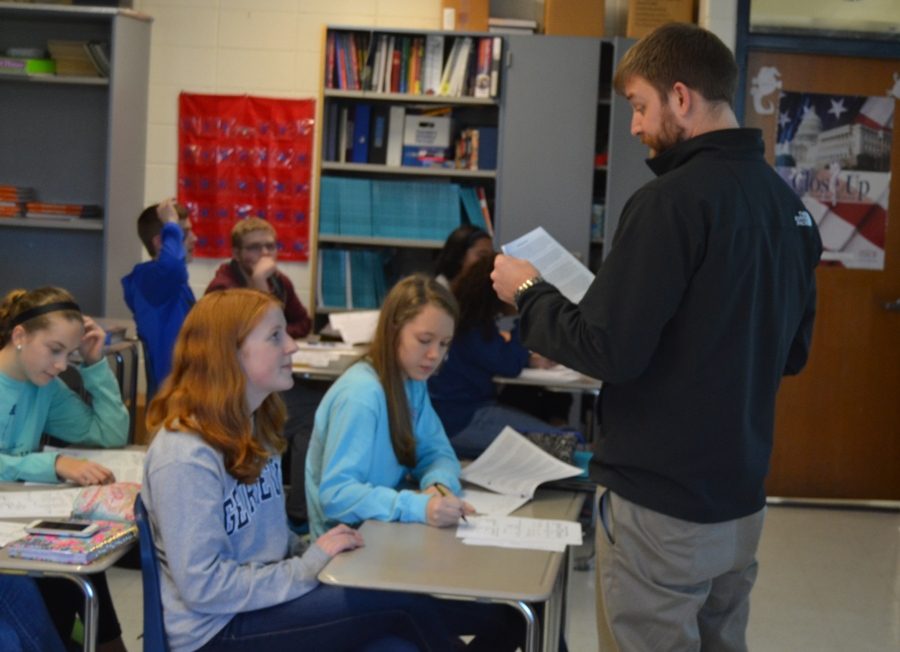Making APs Bara-ble
AP Human Geography prepares freshmen for advanced courses
AP Human Geography teacher Joseph Bara teaches a lesson on agriculture and climate zones. Bara currently teaches three periods of AP Human Geography and plans for more in years to come.
February 13, 2017
As if new lockers, new friends, new teachers, and a new school isn’t enough change, adding an AP class to the mix makes freshman year a large adjustment. Although the stress of AP classes might overwhelm freshmen who are still trying to adapt to their new surroundings, taking these rigorous courses could benefit them in the long run.
“I will know how AP classes work, which I guess I wouldn’t have had the same experience had I not taken this class,” freshman Olivia Herrmann said, who currently takes AP Human Geography. “Having taken an AP class already is going to help me [in the long run]. I applied for three AP classes next year (AP Stat, AP World, and AP Art),” Herrmann said.
AP Human Geography is a fairly new class, undoubtedly growing in popularity over the few years it’s been around. “Three years ago, I started off with one AP Human Geography class, last year we moved to two, right now we are at three, and next year we could have anywhere from three to five,” AP Human Geography teacher Joseph Bara said.
After three years teaching AP Human Geography Bara has an idea of what the class is all about. “AP Human is a lot more oriented towards current events, and real world situations,” Bara said.
More than just a rigor course on paper, AP Human Geography is designed to teach students the value of applying knowledge through reading and writing. Freshman Sydney Turnier caught on quickly. “I understand how the AP tests work,” Turner said. “[They] are a lot different than regular tests, [especially] in the writing and reading.”
Another crucial aspect of the class proves that learning the material consists of more than just a definition on a piece of paper. It’s also about “being able to pull a real world example and show how it connects,” Bara said.
While AP Human Geography may seem difficult as a freshman, it is certainly helpful in the long run. By sophomore year, “I will know how AP classes work. I wouldn’t have the same experience had I not taken this class,” Herrmann said. “Having taken an AP class already, is going to help me.”
Freshman Abby Gayda shares a similar gratitude “this class has taught me a lot-especially how to study for AP style tests,” Gayda said. This is beneficial especially for the students prepared to take multiple AP courses in their high school years to come. Gayda says that if there’s one thing she would tell incoming freshmen interested in this AP class it would be to “study every night instead of studying a lot the night before because it really helps on the tests,” Gayda said.
While some students willingly take AP’s, others feel obligated to due to the high expectations set for them by their parents or society. “The reputation is getting out there that you got to have all these AP’s. In one sense that could be a myth, but in the community we live in the parents are pushing their kids to take AP’s,” counselor Paula O’Shields said.
In reality, the stress settles in “later, maybe junior year or sophomore year,” O’Shields said.
Some students don’t take into consideration the other demands of their time when they jump from having no AP classes to having two or three at a time their sophomore or junior year. “They aren’t looking at the overall balance of life activities outside of the classroom,” O’Shields said. As long as students remain aware of the other demands of their time, stress can be easily maintained.
Gayda has one recommendation for freshmen interested in this AP class, “Make sure you understand what you are learning each day and go over it each night,” Gayda said.





![Senior Devin Fourqurean took this picture while she admired the view from the top of the Eiffel Tower. “It was really cool to see Paris from that high up, especially because you can't see the edge of Paris. It just makes you realize just how big and gorgeous [the city] is,” Fourqurean said.](https://www.theprowlernews.org/wp-content/uploads/2017/01/Feature-1-300x169.jpg)


